Billy Graham
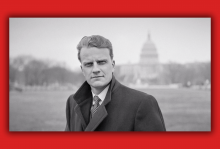
THE TWO-HOUR PBS documentary Billy Graham ran as part of the “American Experience” series, but it could have been subtitled “An American Tragedy.”
The story Billy Graham tells is mostly one of triumph. A boy grows up on a North Carolina dairy farm, becomes the top Fuller Brush salesman in a two-state territory, then answers a call to preach. His crusades attract more than 200 million people and change hundreds of thousands of lives. However, like all the tragic heroes before him, Billy Graham had a flaw. It was neither lust nor greed, the nemeses of so many evangelists. Instead, as one of the commentators in the documentary tells us, Graham was drawn to power “like a moth to a flame.”
In the 1940s Graham led a movement that dragged evangelical Christianity out of the cultural backwoods and into the mainstream of postwar American life. Graham’s early years provide a road map of that movement as he went from ultra-sectarian Bob Jones University to Florida Bible Institute to Wheaton College. He worked as a staff preacher with Youth for Christ, then began a series of independent evangelistic crusades that started in a tent off Hollywood Boulevard in 1949 and culminated, in 1957, with a 16-week run at Madison Square Garden.
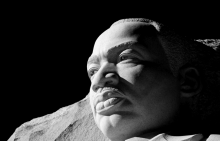
Although more politically conservative and evangelical voices are joining in the #BLM chants of “No Justice, No Peace,” there are undoubtedly shaky voices and (perhaps hostile) minds who hold that while black lives do matter “in theory,” radical institutional change is far too dangerous and subversive, if not completely un-American.
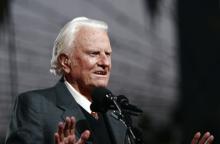
Evangelist Billy Graham died on Feb. 21. Here is a timeline of his life.

Billy Graham died Wednesday morning at his home in Montreat, N.C., at the age of 99.
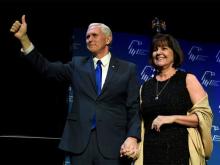
A recent Washington Post profile of Karen Pence mentioned that her husband, Vice President Mike Pence, never eats alone with another woman or goes without her to events where alcohol is being served.
Twitter erupted with outrage and ridicule.
But the Indiana Republican’s practice is not unusual in many conservative Christian circles. As Emma Green pointed out in The Atlantic, it likely stems from something called “the Billy Graham Rule,” named for the 98-year-old international evangelist. Nor is it that much different in intention from the practices of conservative Jews and Muslims.
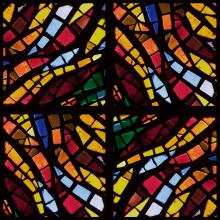
“You are in a year of greatness. You are in a year of restoration,” White preached to a group of some 100 worshippers, almost all of them African-Americans. They had gathered in a large, windowless room at Faith Assembly Christian Center, a simple building in a predominantly black neighborhood of Durham.
Asked afterward about her ties with the president-elect, she declined to be interviewed “out of respect for the church.”
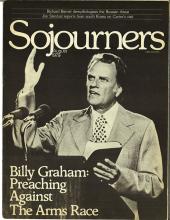
IN 1978, a Sojourners subscriber sent me this quote from a European newspaper reporting on Billy Graham’s visit to the Nazi concentration camp in Auschwitz, Poland: “The present insanity of the global arms race,” Graham said, “if continued, will lead inevitably to a conflagration so great that Auschwitz will seem like a minor rehearsal.” The U.S. media had not reported on Graham’s statement.
I wrote to Billy Graham and asked if what he said, after visiting Auschwitz for the first time, indicated a change of heart for him on nuclear weapons. Billy wrote back to say it did. He agreed to an interview with Sojourners to explain how his thinking had changed about the nuclear arms race, saying that it felt to him like a moral and spiritual question and not just a political issue.
August marks the 71st anniversary of the U.S. atomic bombing of Hiroshima, Japan. When President Obama visited Hiroshima earlier this year, he encouraged leaders to “pursue a world without nuclear weapons” (which is sadly and dangerously ironic coming from a president who is overseeing a 30-year, $1 trillion upgrade of the U.S. nuclear weapons arsenal).
Billy Graham, in that 1979 interview with Sojourners, was clear in his view of the threat posed by nuclear weapons:
Is a nuclear holocaust inevitable if the arms race is not stopped? Frankly, the answer is almost certainly yes. Now I know that some people feel human beings are so terrified of a nuclear war that no one would dare start one. I wish I could accept that. But neither history nor the Bible gives much reason for optimism. What guarantee is there that the world will never produce another maniacal dictator like Hitler or Amin? As a Christian I take sin seriously, and the Christian should be the first to know that the human heart is deceitful and desperately wicked, as Jeremiah says. We can be capable of unspeakable horror, no matter how educated or technically sophisticated we are. Auschwitz is a compelling witness to this.
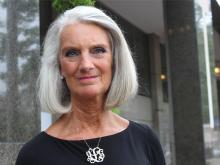
Author and speaker Anne Graham Lotz, daughter of evangelist Billy Graham, has been named chair of the National Day of Prayer Task Force. The announcement on May 5 means that three of the most well-known evangelical women will have led the organization, which promotes the annual event.
Lotz, 67, author of the new book, The Daniel Prayer, talked with Religion News Service about her faith and her family, including the recent loss of her husband of almost 50 years.
The interview has been edited for length and clarity.

Franklin Graham’s Facebook fulminations last week about plans to issue the Muslim call to prayer from the bell tower of Duke Chapel transformed what could have been a nuanced campus debate about religious establishment, sacred space, and pluralism into a countrywide fracas that calls to mind 1980s culture wars.
He helped generate enough publicity to ultimately lead a school better known for porn stars than piety to reclaim its chapel for Christianity.
Why did Franklin Graham’s Facebook post carry this much power? Two reasons. One, some people simply love his narrative about Islam. Recent polling shows that a significant number of Americans believe that Islam is more likely than other religions to encourage violence, and voice substantial support for police profiling of Muslims. Graham’s narrative builds off these suspicions that go far beyond his conservative evangelical constituency.
But more important, he’s a Graham. He carries the power of his father’s name and his legendary evangelistic ministry, the Billy Graham Evangelistic Association, or BGEA. According to Grant Wacker’s new biography, Billy Graham is the closest thing America has had to a pope, beloved by many for his ability to channel the ideals of middle America as much as a convicting gospel. The fact that, despite his retirement in 2005, the BGEA continues to use his likeness in promotional materials and that political candidates left and right still clamor for photo ops with Billy Graham are testaments to his enduring status as “America’s Pastor.”




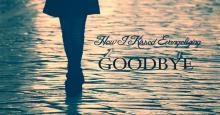
I went to the mecca of evangelicalism for college — beautiful campus in the suburbs of Chicago, where I received a scholarship from none other than the Pope of Evangelicalism, Billy Graham, for my work in street evangelism. As in, speaking to random strangers on the street in order to convert them to Christianity. Post graduation, I became a missionary, the Protestant equivalent of achieving sainthood.
I look back on that girl on fire and marvel at her earnest faith. If I could, I would reach back and massage the tense knots out of her high-strung shoulders, weary from carrying the weight of her neighbors’ eternal destinies. I would wistfully explain to her that the first person she tried to witness to, that gentle, drunken, homeless woman named Kathy, needed more than my rehearsed Roman Road to salvation. Then I would break the Temporal Prime Directive and reveal to her that one day she would become more interested in being evangelized than evangelizing.
The truth is, I’m just better at being evangelized. It’s probably how I was so easily converted at the tender age of 12. The young Christian is expected to learn how to share their testimony: their story of how God changes your life. By the time I was in my twenties, I had given my testimony a bajillion times.
But my own story often bored me.
RECENT POLLS SUGGEST that America’s vaunted religiosity is slipping, including the percentage of people willing to identify themselves as evangelicals. At the same time, the percentage of avowed secularists has risen. A movement calling itself the “New Atheism”—those adamantly opposed to religion—has attracted a considerable following.
The oracles of this movement—including Richard Dawkins, Sam Harris, Daniel Dennett, and the late Christopher Hitchens—deny any possibility of the supernatural, assert that religious belief is irrational, and posit that religion has caused untold evil and suffering throughout history. Because of their dogmatism and their refusal to countenance views other than their own, I refer to these people as “secular fundamentalists.”
Hard data may be elusive, but the latest generation of American young people is much less religious than the last, and the growing secularism they represent could be a byproduct of the polarizing effect of the Religious Right. With evangelical fundamentalism being the dominant and most public form of U.S. Christianity over the last generation, young seekers would rather turn away from all religion than adapt to the harsh expression of faith that excludes so many of their peers and often stands against their aspirations for fairness and equality.
Religious fundamentalism has tainted the reputation of Christianity. For many, unbelief has become more palatable than belief, if believing requires an embrace of the distortions that have so characterized U.S. Christianity over the last several decades.
What prompted the emergence of this New Atheism or secular fundamentalism? What historical forces contributed to its rise? The roots of this phenomenon go back more than three decades—to the political mobilization of a different species of fundamentalism that became the movement commonly known as the Religious Right.
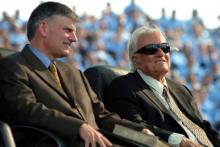
Evangelist Franklin Graham is praising Russian President Vladimir Putin for his aggressive crackdown on homosexuality, saying his record on protecting children from gay “propaganda” is better than President Obama’s “shameful” embrace of gay rights.
The Russian law came under heavy criticism from gay rights activists, and from Obama, ahead of the Winter Olympics in Sochi, Russia. In response, Obama included openly gay athletes as part of the official U.S. delegation to Sochi.
“In my opinion, Putin is right on these issues,” Graham writes. “Obviously, he may be wrong about many things, but he has taken a stand to protect his nation’s children from the damaging effects of any gay and lesbian agenda.”

Pope Francis on Tuesday released his first apostolic exhortation since his election in March. The message, “Evangelii Gaudium” (“The Joy of the Gospel”), challenges Catholics — both laity and clergy — to pay more attention to evangelizing the world.
While most American evangelicals do not usually read papal pronouncements, it would be a shame if we did not familiarize ourselves with Francis’ newest document, for there is much in it that evangelicals could embrace:

An organization of nonbelievers is threatening legal action against public schools that participate in an evangelical Christian charity that delivers Christmas toys to poor children.
The American Humanist Association, a national advocacy organization with 20,000 members nationwide, sent letters this week to two public elementary schools after parents complained their children were being asked to collect toys and money for Operation Christmas Child.
Operation Christmas Child is a project of Samaritan’s Purse, an evangelical relief organization founded by Franklin Graham, son of evangelist Billy Graham. Its stated mission is “to follow the example of Christ by helping those in need and proclaiming the hope of the Gospel.”
The toys collected by Operation Christmas Child come with an invitation for recipients to accept Christianity. Since its founding in 1993, Operation Christmas Child has sent 100 million boxes of toys to poor children.
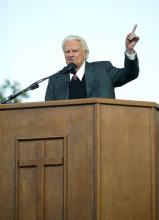
We gathered at Billy Graham’s alma mater over three days to explore his ministry’s place in American history and chronicle its meaning for the future. It was a fascinating conversation, and poignant, too, as Graham struggles with poor health at home in Montreat, N.C., far from the limelight he once commanded.
But as scholars and admirers here in suburban Chicago added to the growing conversation on Graham’s legacy, a question hovers: How many people younger than, say, 60 are listening?
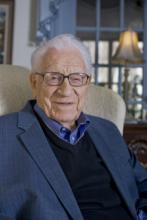
George Beverly Shea, whose signature baritone voice was a standard feature of Billy Graham crusades for more than half a century, died Tuesday at age 104.
He died after a brief illness, the Billy Graham Evangelistic Association announced.
Shea, who was 10 years older than Graham, met the famous evangelist seven decades ago when he was working at Chicago’s WMBI, a Moody Bible Institute radio station. The evangelist heard him singing on the program “Hymns from the Chapel” and asked Shea to sing on his new radio program.
“I’ve been listening to Bev Shea sing for more than 70 years, and I would still rather hear him sing than anyone else I know,” the ailing Graham said in a statement. “I have lost one of the best friends I have ever had, but he and I look forward to seeing each other in Heaven relatively soon.”
Shea, who lived about a mile from Graham in Montreat, N.C., sang before Graham preached as they traveled the globe, often “I’d Rather Have Jesus” or “Victory in Jesus.”